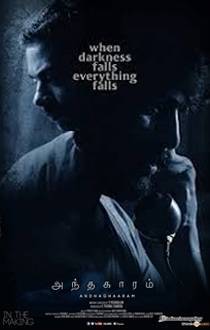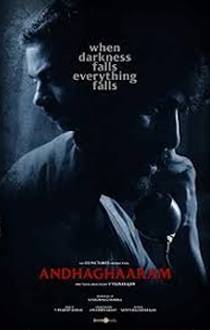ORU PAKKA KATHAI MOVIE REVIEW

Up until sometime back, most of us were oblivious to the fact that a film by the name, Oru Pakka Kathai has been in the cans since its production in 2014. Thanks to OTT, several films that have been languishing in development hell and ones that wouldn’t have seen the light of the day otherwise are here, providing some relief to its makers.
Oru Pakka Kathai comes from the stable of Balaji Tharaneetharan, who gave us the surprise gem, Naduvula Konjam Pakkatha Kaanom and the underwhelming Seethakaathi, though not without flashes of brilliance. How has the filmmaker who has a penchant for being different fared this time around?
Oru Pakka Kathai has an interesting premise - two young lovers who are still in their college finding themselves pregnant though they haven’t had intercourse as yet. Balaji has us convinced in these portions though they look like a tutorial.
Meera (Megha Akash) and Saravanan (Kalidas Jayaram) as the young lads in love and much confused about the situation they find themselves in, deliver solid performances and surprise us with their range.
The story then moves towards godpersons, superstitions, etc, and that’s when a little monotony creeps in. up. Most of the supporting cast are in the form of Meera and Saravanan’s families, and they fit the bill. You also have a parallel track with a child who believes he is an avatar of God – serves as a distraction, whichever way you look at it.
The director also leans on deadpan comedy like he had done in the past with both NKPK and Seethakaathi and they work here as well, especially in the scene where Saravanan is at Meera’s place and is confused as to who’s pregnant. With no dialogues, the director has banked on Kalidas’s eyes and where it follows, and it does the trick.
Production values are at a minimum here, however, considering the middle-class setting, it isn’t much of a complaint. Govind Vasantha’s music is a big plus especially in the scenes where the tension starts to build.
While Balaji certainly has his intentions in the right place and starts off well, the intimate drama we get at the start metamorphoses into larger things involving faith and superstition, and we sort of miss the beginning even while we are closer to the end.
BEHINDWOODS REVIEW BOARD RATING
REVIEW RATING EXPLANATION

ORU PAKKA KATHAI NEWS STORIES
ORU PAKKA KATHAI PHOTOS
OTHER MOVIE REVIEWS
ORU PAKKA KATHAI RELATED NEWS
- Oru Pakka Kadhai, Along The Lines Of NKPK And More ...
- Oru Pakka Kathai Trailer | Megha Akash | Kalidas Jayaram
- Thaanaai Song Lyric Video | Oru Pakka Kathai
- Almost 'Arai Pakkam' Over In Oru Pakka Kathai
- விஜய் சேதுபதியின் ஹிட...
- Exclusive: Megha Akash Replaces Niharika In This Exciting Pr...
- Kutty Love Story Gets Grander By The Day - List Of Stars Onb...
- Breaking: Cast Details Of Kutty Love Story - Dashing Young S...
- Watch The Making Video Of Gautham Menon’s Oru Chance Kudu!
- Work On Vijay Sethupathi, Megha Akash, Mohan Raja Film Is In...
- விஜய் சேதுபதி - இயக்கு...
- Watch The Teaser Video Of Gautham Vasudev Menon's Latest Pro...
- 'கார்த்திக் டயல் செய்த...
- Vijay Sethupathi's Next Ropes In This Mimicry Legend!
- மாஸ்டர் வேலை முடிந்தத...
ORU PAKKA KATHAI RELATED LINKS
- Oru Pakka Kathai - Trailer - Videos
- Oru Pakka Kathai | List Of Tamil Movies Expected To Release In The Next 3 Months - Slideshow
- Oru Pakka Kathai - Videos
- Oru Pakka Kathai
- Seethakathi (2018) | Director Mahendran's Onscreen Roles: A Lookback - Slideshow
- Seethakaathi | 10 Best Tamil Movies Of 2018 - Slideshow
- 4. Visiri - Enai Noki Paayum Thota | Most Played Songs On Radio In 2018 - Official List - Slideshow
- Boomerang (Atharvaa - Megha Akash) | List Of Tamil Films To Release In September 2018 - Slideshow
- 3
- 3 | Behindwoods Puzzle: Lets Play! Can you guess these movies from the picture connects? | Part 1 - Slideshow
- 3 | GVM's Karthik Dial Seytha Yenn: What's the audience response? Check out a few here! - Slideshow
- 3 | Rana & Mihika's Roka done right! Unseen pictures here! - Slideshow
- 3 | Sunny Leone's funny Emergency COVID masks version! Don't miss! - Slideshow
- 3 | Empty Chennai streets during Janata Curfew - Exclusive Photos of the shutdown! Don't Miss! - Slideshow
- 3 | ஹீரோயின்களுக்கே டஃப் கொடுக்கும் ஜெயம் ரவியின் மனைவி..! கணவன் - மனைவியின் Stylish Overloaded Tour. - Slideshow



































